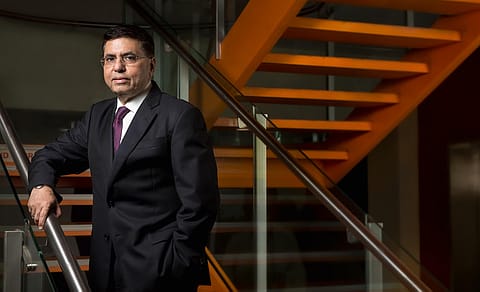Businesses must be prepared for turbulence: HUL’s Sanjiv Mehta
One can never predict a risk-free world, says Mehta

In January 2020, Sanjiv Mehta, MD and CEO, Hindustan Unilever (HUL), set up a crisis team to battle the outbreak of the COVID-19 pandemic in China. Since HUL was importing chemicals from China, the crisis management team was set up to figure out a way to manage the apparent disruption. Little did Mehta imagine the pandemic would soon make its way into India and completely disrupt the FMCG major’s India operations. “With the benefit of hindsight, I wish I had estimated that it would come to India. We could have been much better prepared,” says Mehta.
He was responding to a question on how to do business in an environment where volatility and uncertainty have become a way of life. It began with the COVID-19 pandemic, which was followed by all-time high commodity inflation and then the Russia-Ukraine war, which resulted in hyperinflation.
“Despite all the predictions and analytical support, one can never predict a no-risk world,” he says. So, businesses have to be constantly prepared for turbulence, and for that, they need to make their business model efficient as well as resilient. “If you look at the last two decades all companies have been driving towards productivity and efficiency, but to be resilient you need spare capacity too. The important bit is where you will drive for efficiency and where you will drive for resilience,” explains Mehta.
He also talks about ‘sense-making’ as an important attribute of leadership, especially in turbulent times. “The key that people need to inculcate is sense-making, which is to make sense out of disparate information, put it together, improve and refine it. Sense-making comes from experience through intuition.” He says that leaders need to trust their intuition and take quick decisions rather than wait for the perfect moment. “If you wait for perfection you might be too late.”
He also emphasises the need to remove the fear of failure. “At the end of the day business entails risk and risk entails failure. So, culturally removing the fear of failure is important, so that people can augment their intuition with data and move ahead and make bold decisions.”
Speed and agility have become must-haves in an uncertain and volatile world. Mehta looks at speed and agility from three angles. “First is how quick are you in identifying an opportunity or challenge. The second is if you have identified an opportunity or challenge how quick are you in taking a decision? Once you have made a decision, how quick are you in executing it? That’s what will bring in speed and agility. It’s not about an activity that I used to do in eight hours and now I am doing it in six hours so I brought in speed and agility. It is a limited definition,” he says.
Speed is also about one’s ability to meet changing demands, says Mehta. He cites the example of converting their nitrogen plants to oxygen to meet the demand for oxygen during the peak of the pandemic. He also talks about the decision to fast-track the manufacturing of sanitisers. “If you manufactured thousands of SKUs and you are manufacturing an SKU once every 30 days, your ability to meet the changing demand would be low but if you are making an SKU every three or four days, your ability to meet the changing demand would be high,” he explains.